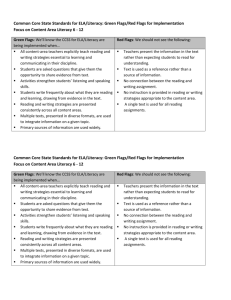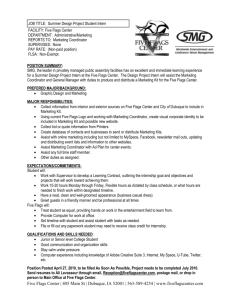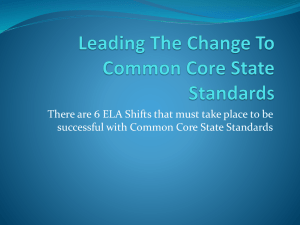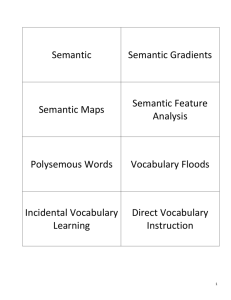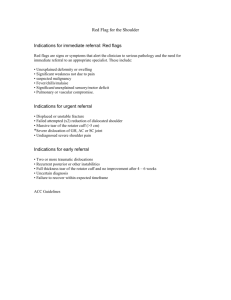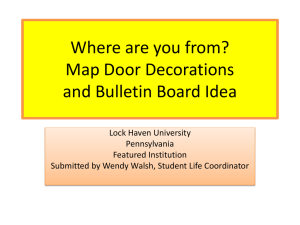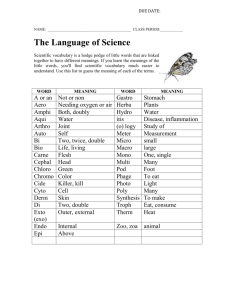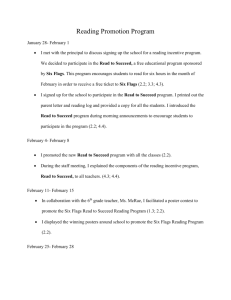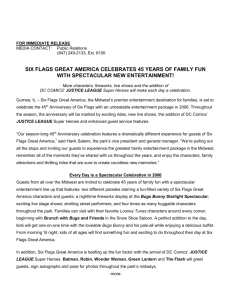Two
advertisement
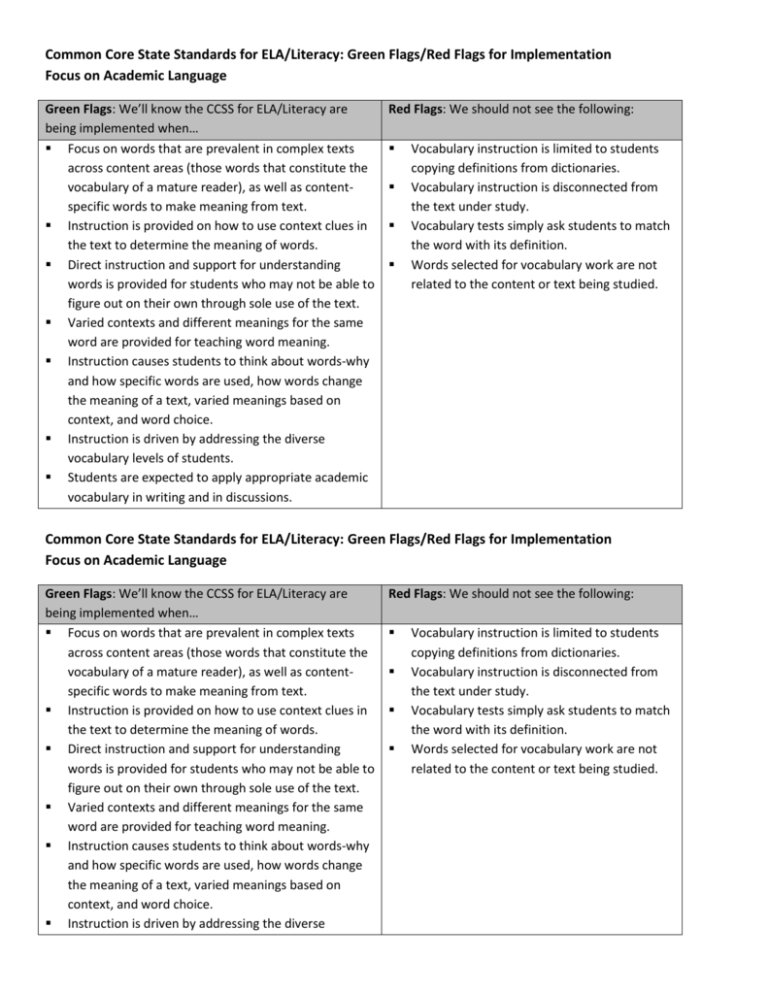
Common Core State Standards for ELA/Literacy: Green Flags/Red Flags for Implementation Focus on Academic Language Green Flags: We’ll know the CCSS for ELA/Literacy are being implemented when… Focus on words that are prevalent in complex texts across content areas (those words that constitute the vocabulary of a mature reader), as well as contentspecific words to make meaning from text. Instruction is provided on how to use context clues in the text to determine the meaning of words. Direct instruction and support for understanding words is provided for students who may not be able to figure out on their own through sole use of the text. Varied contexts and different meanings for the same word are provided for teaching word meaning. Instruction causes students to think about words-why and how specific words are used, how words change the meaning of a text, varied meanings based on context, and word choice. Instruction is driven by addressing the diverse vocabulary levels of students. Students are expected to apply appropriate academic vocabulary in writing and in discussions. Red Flags: We should not see the following: Vocabulary instruction is limited to students copying definitions from dictionaries. Vocabulary instruction is disconnected from the text under study. Vocabulary tests simply ask students to match the word with its definition. Words selected for vocabulary work are not related to the content or text being studied. Common Core State Standards for ELA/Literacy: Green Flags/Red Flags for Implementation Focus on Academic Language Green Flags: We’ll know the CCSS for ELA/Literacy are being implemented when… Focus on words that are prevalent in complex texts across content areas (those words that constitute the vocabulary of a mature reader), as well as contentspecific words to make meaning from text. Instruction is provided on how to use context clues in the text to determine the meaning of words. Direct instruction and support for understanding words is provided for students who may not be able to figure out on their own through sole use of the text. Varied contexts and different meanings for the same word are provided for teaching word meaning. Instruction causes students to think about words-why and how specific words are used, how words change the meaning of a text, varied meanings based on context, and word choice. Instruction is driven by addressing the diverse Red Flags: We should not see the following: Vocabulary instruction is limited to students copying definitions from dictionaries. Vocabulary instruction is disconnected from the text under study. Vocabulary tests simply ask students to match the word with its definition. Words selected for vocabulary work are not related to the content or text being studied. vocabulary levels of students. Students are expected to apply appropriate academic vocabulary in writing and in discussions. Common Core State Standards for ELA/Literacy: Green Flags/Red Flags Evidence Walk Template Focus on Practice with Academic Language Students are Focusing on words that are prevalent in complex texts across content areas to make meaning of text. Focusing on content-specific words to make meaning from text. Receiving instruction on how to use context clues in the text to determine the meaning of words. Receiving direct instruction and support for understanding words they may not be able to figure out on their own through sole use of the text. Applying appropriate academic vocabulary in writing and in discussions. Being provided varied contexts and different meanings for the same word to learn word meaning. Discussing why and how specific words are used and how words change the meaning of text and vary meanings based on context and word choice. Copying definitions from dictionaries. Taking a vocabulary test that asks them to match the word with its definition. Studying words that are not related to the content or text being studied. Common Core State Standards for ELA/Literacy: Green Flags/Red Flags Evidence Walk Template Focus on Practice with Academic Language Students are Focusing on words that are prevalent in complex texts across content areas to make meaning of text. Focusing on content-specific words to make meaning from text. Receiving instruction on how to use context clues in the text to determine the meaning of words. Receiving direct instruction and support for understanding words they may not be able to figure out on their own through sole use of the text. Applying appropriate academic vocabulary in writing and in discussions. Being provided varied contexts and different meanings for the same word to learn word meaning. Discussing why and how specific words are used and how words change the meaning of text and vary meanings based on context and word choice. Copying definitions from dictionaries. Taking a vocabulary test that asks them to match the word with its definition. Studying words that are not related to the content or text being studied.
